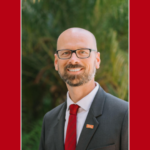Long before Joe Panetta became president and CEO of Biocom — California’s largest and most-experienced advocate for the life science industry — he was instrumental in the creation of the Master of Science in Regulatory Affairs program at San Diego State University’s College of Sciences. Offered in partnership with SDSU Global Campus, the online program provides critical ongoing training and education to those involved with the development, testing, manufacturing, and commercial distribution of pharmaceutical, biologic, veterinary, and medical device products.
“I was working in the RA arena — in the biotech and agricultural chemicals industry — here in San Diego, and one of the things we began to realize as the life science industry grew, is that we were bringing into play the need for people to interface with the FDA and other regulatory agencies as companies were moving from early research stages to product development and clinical trials and compliance, and manufacturing as well,” said Panetta. “We didn’t have that level of workforce here in San Diego. We didn’t have the history of having had a pharmaceutical industry or chemical industry and so we didn’t have many of the trained RA professionals that we knew we would need as the industry continued to evolve here. We recognized that it would be important to create this homegrown workforce of RA professionals rather than to try and import them from across the country. That was really the genesis for creating the RA program at SDSU, which I was involved in as both a supporter and a consultant.”
Panetta answered some questions about the industry and SDSU’s Master of Science in Regulatory Affairs program.
For those who may not know, what exactly does a regulatory affairs professional do?
Regulatory affairs professionals are the primary interface between the company and the folks in government who have the responsibility for ensuring compliance with regulations and with legislation. RA professionals are really the ones who ensure that a company can produce the information and data that are needed to keep them in business in terms of their products being approved by the government.
What’s the current need for RA professionals?
The need has always been high and it’s also always changing and evolving from the standpoint that technologies change in the development of all kinds of products whether we’re talking about drugs or medical devices. Today we’re even talking more about telecommunications types of applications that also incorporate software and genetic information. The field of medical technology is always evolving, always maturing, always changing and so there’s a constant need for people who are trained in understanding the regulatory requirements that are created around those new technologies.
What’s a key feature of SDSU’s program?
One of the important things about the program is that it brings into play experts in the field who can ensure that the training that’s done is state-of-the-art, and also it brings many of the folks [students] into the program who’ve already had experience in the industry and that’s important as well. Not that folks can’t come into RA without any industry experience, but typically we see people in the program who have had some level of experience working with a company before they go into RA.
How would a Master of Science in Regulatory Affairs benefit someone’s career?
The program provides an opportunity for people to move into a field which is always in demand and an opportunity to progress within their own company into an arena that brings some of the critical skills that many people already have, for example having been employed in a company as laboratory technicians or having been involved with some other aspect of product development. The RA affairs profession gives people the opportunity to bring together a lot of different disciplines and to make them work together in a way that produces a package of information that is going to ensure that that company is going to be successful in bringing its product to market or ensuring the company is going to be successful in its compliance efforts with the product that’s already on the market.
Anything you’d like to add?
There’s going to continue to be a demand here in San Diego for more RA professionals in the future because we’re constantly creating new life science companies and constantly creating a need for people to take products through clinical trials and interface with the FDA and other regulatory agencies. The program equips students to work in the industry. Another thing about the RA arena is that it’s a profession that pays very well.
SDSU also offers an Advanced Certificate in Regulatory Affairs, a four-course subset of the M.S. degree program, to which all courses are transferable.





